



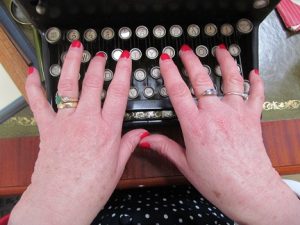
“I hope I am not in the way Mrs Travers (our woman what does but not a lot)?”
“Not at all Mrs Wylie, there is nothing I like better than the clattering of yon auld Royal when I’m preparing sweeties for yous tae gi’e as presents produced by your own fair hands. Might I add what an excellent idea tae ha’e yer boudoir redecorated just before Christmas, adding tae the chaos that the season generates as a result o’ its ritual significance.”
“Well I felt it needed a freshen and one has to take a good painter and decorator when one can.”
“Indeed, Mrs Wylie I have often heard Lady Pentland Firth say much the same thing. Do you think it is normal to wear a pair of overalls open to the waist Mrs Wylie? I mean wi they windaes open full tilt; it is nae exactly warm.”
“I am more than aware that Matt Gloss is fully aware of his charms Mrs T, but frankly I am more interested in his finish than his chest which quite frankly looks like a rag rug. Anyway, hopefully he will be out of here by Friday. To change the subject, I take it Gayle was no trouble last night while Mr Wylie and I were having suppa with Professor and Mrs Chatterjee?”
“Not at all Mrs Wylie. She is quite excited about the Nativity Play and after she recited her lines, we had hot milk and then up the wooden hill to Bedfordshire, where I read her a story. Then I had a quiet evening watching a new programme about people in the North.”
“Not Aberdeen!”
“No Manchester, it was called Coronation Street and is about ordinary people and their lives. There’s a pub at the centre o’ things.”
“Isn’t there always?”
“Yes, but the landlady is a pretty formidable character; reminded me of you Mrs W.”
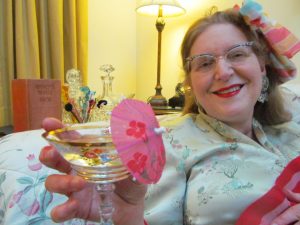
“I am not sure if I like being thought of as someone who might serve behind a bar. One can only hope it was not filmed in the Public Bar. Was there anyone like you?
“Aye, a Mrs Tanner, living on her wits, wi’ a son just oot o’ prison. It spoke to me.”
“What about Mr Wylie; anyone like him?”
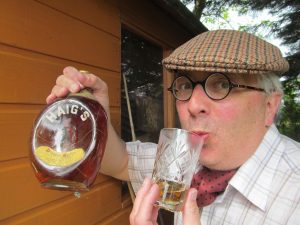
“Well there is a character called Ken Barlow who could be Mr Wylie when he was younger, living with aspirations and working class parents who use brown sauce and drink tea with every meal.”
“Thank goodness I saved him and introduced him to Béarnaise.”
“Indeed, Mrs Wylie. Social mobility is a wonderful thing. Now some coffee and perhaps you’d like to taste the tablet?
“That would be ideal. Can we have my special Blue Mountain from Thomson’s and that will help me with my thank you letter to Mrs Chatterjee.”
Dear Mrs Chatterjee,
I have sent you one of my handmade thank you cards by separate post, which I hope has arrived safely. The fabric is an original Paisley pattern fragment left over from a shawl my mother had made into cushions during the first unpleasantness. I thought with your textile businesses it would be of particular interest to you.
Once again may I say that my husband and I had a most enjoyable evening with you and the Professor. The stories of his advances in craniotomy procedures were as fascinating as the food. I know Jasper was intrigued by the Mughal influences on your cuisine and I am quite sure you can expect an invitation to speak at his Historical Society. I, for one, find it fascinating that we share a tradition of chutney and who knew lentils were so versatile. As I was saying I do have one or two connections with your part of the world. I cannot remember all the details, but I think we were heavily involved in the East India Company, but no doubt in a helpful sort of way.
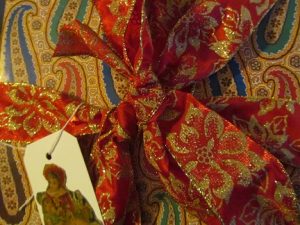
You very kindly asked me for some background information on Christmas in Scotland as you have been invited to several Faculty parties. It is a great shame you do not have time to attend my lecture-ette on festive table decorations and gift wrapping as this would have been a good starting point. It also includes coffee and mince pies as well as a free candle in a colour of your own choice.
I hope the following points may be helpful.
Christmas has only recently been reintroduced to Scotland. For many centuries it was under the shadow of a Mr John Knox, who having been a galley slave had a bit of a chip on his shoulder. He was not very keen on fun, music, the theatre or even women for that matter. These ideas came together to form the Church of Scotland. For a very long time Christmas was banned here, which is not of course good for those of us in the decorative business.
As many Scots drifted south to That London they picked up on the idea of Christmas once again. In the Victorian times which were the main times of Queen Victoria’s reign, the Scottish newspapers and magazines showed an increased interest in selling unnecessary things for the festive season. New Year, however, continued to be the focus of the Scots trying to cope with winter. During the 1939-45 Unpleasantness, Scotsmen experienced Christmas abroad and brought ideas, and presents, back with them.
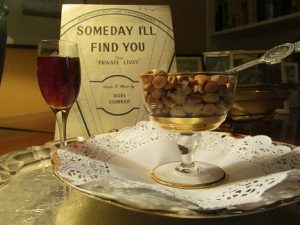
it was not until 1958 that Christmas Day became a public holiday in Scotland and many men do still work at least until lunch time on the 25th. Jasper himself still goes to the office although this seems to involve much sherry drinking and eating of peanuts (with a spoon naturellement) with Miss Tilling, our book-keeper, at the Glasgow branch of ‘Chez Nous’. Increasingly, however, one sees signs of Christmas spreading throughout the country.
The gentry, and those and such as those, have always celebrated Christmas. They, after all, spend part of the year in the south and picked up ideas which would have given John Knox the vapours. I am quite sure with your husband occupying such a leading position at the very good varsity here in Glasgow, this will be your milieu Mrs Chatterjee.

It is important to remember that despite being especially important these members of society are notoriously fixed in their views. They do not ascribe to the extravagance associated with Christmas one sees elsewhere. It is not about what one spends, it is how one spends it.
In terms of preparations, Christmas is always spent in the country. From here one sends one’s Christmas cards which were bulk bought 20 years ago. Nothing is wasted and the ability to turn an envelope inside out and re-use is considered a virtue. An unfranked stamp is like corn in Egypt.
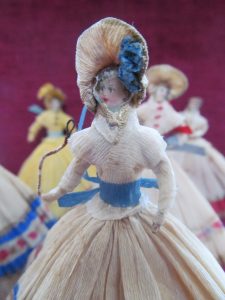
The house should be decorated in the Georgian style with evergreens. A tree from one’s own estate is desirable. It should be decorated with old family baubles, damaged or threadbare – it doesn’t matter just so long as there is a story. For example, a tartan bow from Flora MacDonald’s hair or a buckle from Bonnie Prince Charlie’s shoes, but no tinsel, that is for the common people. Some bright ribbon will suffice. On the hall table the lady of the house might arrange a few teazels and dried hydrangea heads in an 18lb brass shell case brought back by her husband, the Major, from Ypres. Their children will also be encouraged to make decorations that will be brought every year until they fall to pieces.
If one still has help or perhaps a woman from the village, who is “a treasure”, the weeks before Christmas will be spent preparing the rich plum or Christmas puddings. The Scottish version of this is the clootie dumpling which is served with neither custard nor cream, but a traditional white sauce. It is boiled.
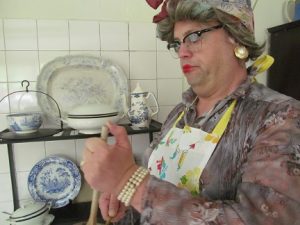
My ‘treasure’, Mrs Travers, boils ours for some unknown reason in the top loader, so it often tastes of Jasper’s corduroys. There is also a tradition of making a Christmas cake, covered in marzipan which is then iced. The gentry tend to like this as it is made from Granny’s recipe (even although Granny never saw the inside of a kitchen) and serve it until April if anyone calls. No one else likes it so it is generally thrown out in March.
It is generally believed that presents are opened by those and such as those on Christmas Eve. In fact, this is generally formed upon as it is a custom of certain continentals. The Royal Family do this, but they come from Europe. Presents are opened either after church or after lunch. Children are kept waiting to teach them discipline, although a stocking may be opened first thing. This will contain a tangerine, some chocolate coins and a card game like Happy Families to occupy them until breakfast. Presents are useful or amusing after all one has everything one needs.
Talking of breakfast, and I should. This modern notion of a full Scottish or even smoked salmon and scrambled eggs with champagne is most definitely a no. After all one has a heavy lunch in prospect. The usual porridge made with water will suffice, after all the Jacobites marched on it. If one really wants to push the boat out, then two boiled eggs with marmite soldiers should see one comfortably through church. One does not want any tummy rumbles even if it is that ridiculous service where parents show off their children’s toys. There is always one child of course who plays a toy drum through “O Come all ye faithful”, while parents look on envisaging the next Gene Crouper in the pews. Church is followed by Madeira in the Library, with home made cheese straws and things wrapped in prunes.

Christmas Day is the one day where the main meal can comfortably be eaten in the middle of the day, well at one o’clock to be precise so that one is ready for Her Majesty at 3pm. Presents are generally exchanged afterwards and some bad taste is allowed as most of these people have been at boarding schools. Even if the present is hated, the response will be “oh how marvellous, something useful” or “how clever – did you make it yourself?” The rest of the afternoon is spent sleeping or doing jigsaw puzzles.
Tea is served from the trolley and has been arranged in advance by the dear little woman from the village who has not minded in the least giving up her day despite visiting family from Canada she hasn’t seen for twenty tears. There are sandwiches and Christmas cake although, as mentioned, the cake is usually untouched but looks delightful.
If people are staying, the evening is given over to charades or violent games such as Blind Man’s Bluff or Murder. Boxing day is for hunting or walking, with hot soup in flasks. Crumpets are often served on return as they are so comforting and remind them all of the nursery.
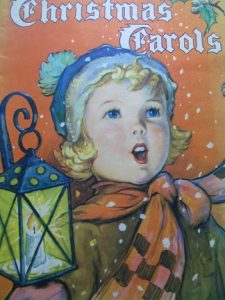
Alternatively, of course Mrs Chatterjee you and your dear husband may be invited to spend Christmas with the family of a poor medical student in some part of Glasgow called a Scheme where hunting is mainly done by the police. Here you will find Christmas is increasingly kept with enthusiasm by the poorer classes. This is immediately recognisable by the silver artificial tree on a table which would look like a rather large lavatory brush if it could be seen through the mass of tinsel covering it. The ceiling and walls are bedecked with paper chains, paper bells and balloons.
The children called “weans” have been up since 4a.m. and are carnaptious by breakfast, which is of course the full Scottish with tattie scones. The presents are on a vast scale and will take the rest of the year to pay for.
Christmas Lunch is still called dinner and will include soup, two or three joints of meat, all manner of trimmings and roast potatoes and mashed potatoes. All followed by the sweet which is a choice of dumpling or a trifle made with sponge fingers, tinned fruit cocktail, tinned custard, tinned cream and hundreds and thousands as well as glacé cherries. This will be served at the table with another table for “the weans”, Great Aunt Nettie, and “that wee woman, doon the stair, Mrs MacGregor who is on her own. There will be crackers with paper hats. The drinking will begin after watching Her Majesty on the new TV from Radio Rentals and lasts until 2nd January.
Avoid Christmas invitations to on the South Side as this is least attractive experience. It is mostly spent at neighbours’ cocktail parties in a state of anxiety worrying “if we are doing Christmas right.” If at all possible stick to the West End which is far more civilised.
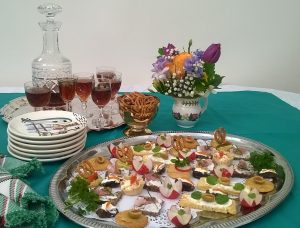
Well, I do hope this has been a helpful insight into the developing Scottish Christmas. I could mention New Year, but this can wait as I don’t want you to suffer from cultural overload. In the meantime, I look forward to seeing you on the 27th at our cocktail party which I can assure you will have red and green cocktail onions, simply marvellous canapes and demonstrate the art of gracious living.
With all good wishes to you the professor
Yours sincerely,
Muriel Wylie (Mrs)
December 1960